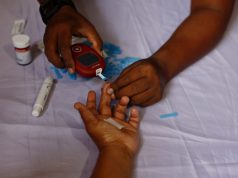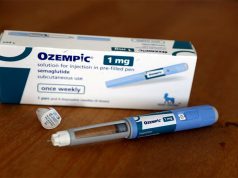Experiencing a tingling, prickling sensation on your hands and feet? Or do your hands and feet often feel sudden numbness?
These are symptoms of diabetic neuropathy, a condition common among diabetics, caused by damaged and compressed nerves. Bad news: according to studies, more than half of Filipino diabetics suffer from diabetic neuropathy.
Even worse news: around 80% of patients with diabetic neuropathy go undiagnosed — hence the condition causing more complications.
This is because diabetic peripheral neuropathy is often dismissed by patients and even doctors, doctor Kenny Merin, pharmacist and Assistant Vice President, Academics & Research of Lyceum of the Philippines University-Davao said during the recently concluded Know the Signs forum organized by Procter & Gamble Health.

Merin explained that this condition is often caused by diabetes. However, obesity, alcohol misuse and vitamin B deficiencies can also cause peripheral neuropathy.
Symptoms often dismissed by patients and doctors include:
- Tingling in the hands and feet
- Muscle weakness
- Burning sensation
- Numbness
“Peripheral neuropathy is often undiagnosed by doctors in the Philippines and undermined by patients because they feel it’s just part of the disease, which can be addressed if we identify it early,” Merin said.
This is why doctors and patients should watch out for diabetic peripheral neuropathy, as it can be treated if detected and treated early.
However, if left untreated, peripheral neuropathy can lead to permanent nerve damage — which means the patient will continuously experience muscle pain, numbness and weakness.
Merin said Filipinos should be proactive in assessing their symptoms, especially if thy often experience the issues associated with diabetic neuropathy.
Local pharmacists, too, Merin added, should be proactive in asking patients about their symptoms —particularly those at risk of diabetic neuropathy.
This is because, Merin explained, Filipinos often consult pharmacists first before doctors when experiencing health issues.
“Pharmacists are often the first point of contact and can drive early awareness of a patient’s condition, offer guidance on lifestyle modifications, and help optimize medication regimens,” he said.
To check for symptoms of peripheral neuropathy, pharmacists and patients can do simple tests, like:
- Touch sensitivity test using cotton or a tissue; touch the tips of the fingers to see if they will feel any sensation
- Texture perception test using a feature
- Pain perception using a toothpick
Those with diminished sensations in any of those tests, Merin said, are recommended to take vitamin B supplements.
Meanwhile, those at risks of diabetic neuropathy should practice simple health protocols, such as:
- For diabetics, managing symptoms and keeping blood sugar in check
- Staying active and regular exercise
- Healthy lifestyle choices, including avoiding smoking and drinking alcohol
- Regular check-ups with doctors and specialists










